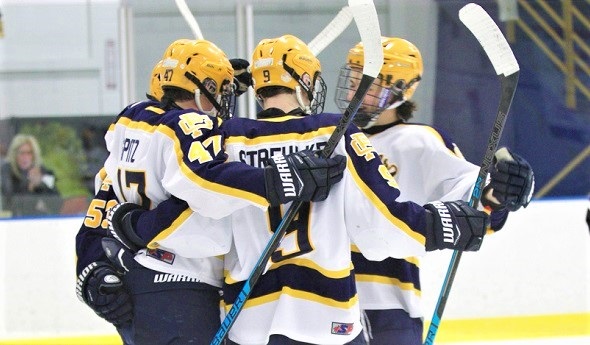
Resurgent GP South Off to Stunning Start
By
Tom Markowski
Special for Second Half
January 23, 2020
It’s been eight years since Grosse Pointe South played for an MHSAA Finals championship in ice hockey.
 But even though we’re just past the halfway point of this season, the Blue Devils have shown they have what it takes to make a trip back to Plymouth for another title shot.
But even though we’re just past the halfway point of this season, the Blue Devils have shown they have what it takes to make a trip back to Plymouth for another title shot.
South is 13-2 and ranked No. 2 in Division 3 in the latest state coaches association poll. To say things have been clicking would be an understatement. Not only have the Blue Devils surprised most in the Metro Detroit area, they’re the surprise team, statewide, in their division.
Take one game recently as a prime example. Detroit Catholic Central is the reigning Division 1 champion and currently ranked No. 1. On Jan. 8, South traveled to Catholic Central’s home arena (USA Hockey Arena, also the home of the MHSAA Finals) and defeated the Shamrocks 4-3.
The result stunned many. Catholic Central entered the game having won its last six by shutout. Less than four minutes into the game South’s David Rivard scored off a pass from Keegan Spitz to end that scoreless streak.
In addition to this incredible win, the Blue Devils received an immeasurable amount of self-confidence.
One contributor who’s playing with supreme confidence is senior goaltender Will Strickler. A two-year starter, he also played as a sophomore – and in fact his first game was against Catholic Central.
“We got shelled, 9-0,” Strickler said. “In the last three years only two teams from Michigan have beaten CC – (Bloomfield Hills) Brother Rice and us. That (victory) made a statement. We’re for real. We also stopped their shutout streak, which was nice.”
Before the start of this season, there likely were few who thought this was possible. Last season South finished 7-18-2, losing to Warren De La Salle Collegiate 3-1 in a Division 3 Pre-Regional. The season before, South finished 9-16 and ended with a loss to Brother Rice 3-1 in a Division 2 Regional Final.
Even though the Blue Devils returned most of their starters this winter, there were concerns. The most obvious question was how this experienced team would play with a new coach.
Paul Moretz took over the program after last season, and this is his 22nd coaching hockey. A graduate of Port Huron High, Moretz started coaching when he was 21, almost immediately after graduating from Western Michigan University. He began with youth hockey in Port Huron before moving on to the Honey Baked Hockey Club and Littles Caesars Amateur Hockey League. He spent the last 10 seasons with Little Caesars, and though this is his first stint coaching high school hockey, he said the timing was right.
“The AAA team I coached was with me all the way up,” Moretz said. “We knew last year would be our last together, so that was going to be it.
“I applied for the South job and, to be honest, I had no clue (how good this team would be). I knew there was potential. I knew it was a good group of young men. I knew there was a group who wanted to work. I didn’t know if that would transform into wins.”
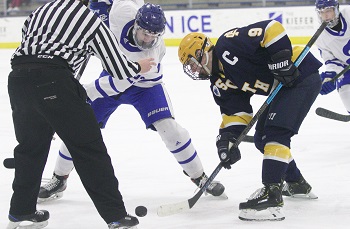 Of the 23 players Moretz has on varsity, 10 are seniors, most playing important roles. It’s common for a team with such success to be senior-dominated – although Moretz added that 13 potential returnees bode well for the team's future.
Of the 23 players Moretz has on varsity, 10 are seniors, most playing important roles. It’s common for a team with such success to be senior-dominated – although Moretz added that 13 potential returnees bode well for the team's future.
Spitz, a forward, leads the team in scoring with 18 goals and 16 assists. Adam Strehlke, who centers the top line, is next with 12 goals and 12 assists. Both are seniors. Next are two juniors, Aaron Vyletel (14 goals, seven assists) and Dean Therriault (eight goals, 13 assists).
South sports four captains, with Strehlke and Therriault joined by Xander Mills and Tommy Daudlin. All are seniors. “Our leaders are our captains,” Moretz said. “Quite frankly, we have a lot of leaders.”
Lacking in size, South plays fast. The Blue Devils chase the puck and attempt to create scoring chances with their forechecking.
South’s lack of physical play may have hurt in its two losses, both to state powerhouse Trenton. Trenton won the first game 3-2 in overtime and the second 2-0, with the second goal coming after South pulled its goalie. But South did send 35 shots on goal the first time, and 34 the next.
“We’re a puck-first team,” Strickler said. “Coach told us that against Trenton to let them make their runs. Just go for the puck. Playing physical hasn’t been a key for us.”
That doesn’t mean there hasn’t been a concerted effort to play more consistently on the defensive end. Last season Bloomfield Hills Cranbrook Kingswood downed South 10-2. This season, in the game immediately following the victory over DCC, South defeated Cranbrook Kingswood, 6-2.
Strehlke points to four reasons for his team’s turnaround. One is Moretz – and, partly because of the new coach, there’s a new attitude.
Strehlke also said players are more committed. And you can’t overlook the experience.
“(Moretz) is part of it,” he said. “But everyone has bought in. We’re playing better defensively. We’re allowing fewer shots. And Will has played well all year.
“You know winning, it’s more fun coming to the rink. Last year it wasn’t fun.”
To Moretz, coaching at this level is no different than it was for him coaching for Little Caesars or elsewhere. For one, he has his longtime assistant Nathan Reilly with him. Moretz allows Reilly the freedom to coach without micromanaging. Another key element, according to Moretz, is having his players pay attention to detail.
“They’re willing to do the little things,” he said. “They trust the game plan, and they execute it very well.”
 Tom Markowski is a correspondent for the State Champs! Sports Network and previously directed its web coverage. He also covered primarily high school sports for the The Detroit News from 1984-2014, focusing on the Detroit area and contributing to statewide coverage of football and basketball. Contact him at [email protected] with story ideas for Oakland, Macomb and Wayne counties.
Tom Markowski is a correspondent for the State Champs! Sports Network and previously directed its web coverage. He also covered primarily high school sports for the The Detroit News from 1984-2014, focusing on the Detroit area and contributing to statewide coverage of football and basketball. Contact him at [email protected] with story ideas for Oakland, Macomb and Wayne counties.
PHOTOS: (Top) Grosse Pointe South players celebrate during a 5-1 win over Riverview Gabriel Richard on Jan. 4. (Middle) Blue Devils senior Adam Strehlke (9) wins a faceoff during a 4-3 victory over Detroit Catholic Central on Jan. 8. (Photos courtesy of Brian McKenna and the Grosse Pointe South hockey program.)
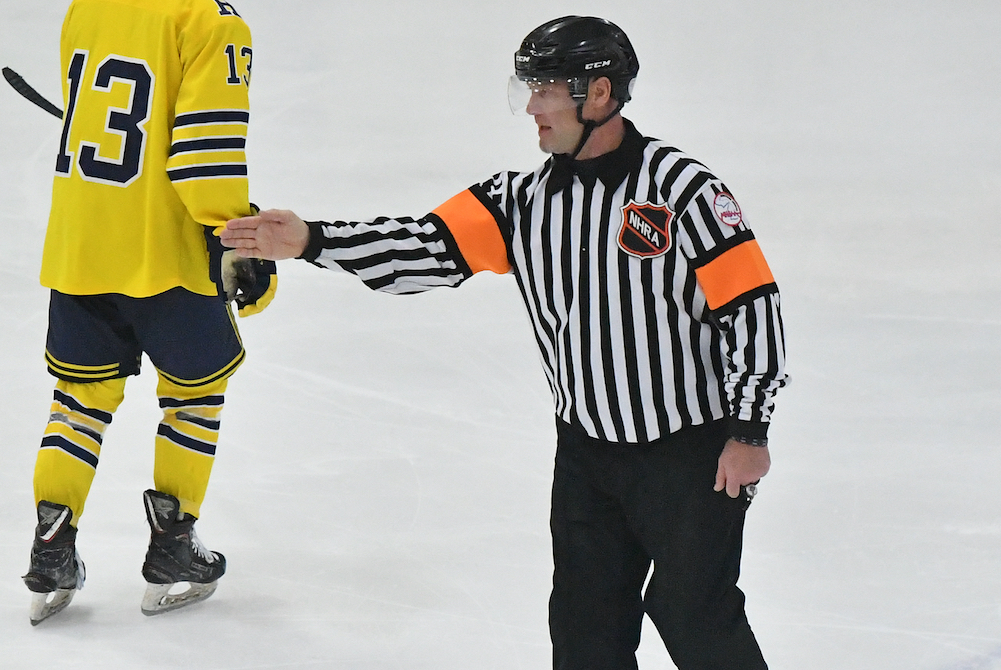
Retired NHL-er Back on Ice to Answer Call - By Making Them
By
Rob Kaminski
MHSAA benchmarks editor
March 16, 2023
The most accomplished skater on the ice during Friday’s triple-overtime MHSAA Division 1 Semifinal hockey thriller between Hartland and Brighton was not wearing the school colors of either team.
In front of a packed house at Plymouth’s USA Hockey Arena, referee Bryan Smolinski was in stripes, just like the rest of his officiating crew.
In his former life, he pulled on plenty of sweaters before lacing up the skates. That happens when one logs more than 1,000 games, tallies nearly 300 goals (274) and close to 400 assists (377) with eight teams spanning a 15-year playing career in the National Hockey League.
So, how did the 52-year-old former star player find himself on the ice last weekend as one of the referees for the pinnacle weekend of this high school season? Good question, even for the man known as “Smoke” during his playing days.
“I was working in youth development programs a few years back and reached out to some Michigan guys I had connections with about other ways to help the game,” Smolinski said. “I called Kevin May just to chat and asked, ‘Hey, how’s your reffing going?’ He said, ‘You know, we’re down a little bit,’ then said, ‘Why don’t you do it?’ I said, ‘Not a chance,’” Smolinski laughed.
Never Say Never
May persisted, imploring his friend to skate with him during a Fall league at Cranbrook in Bloomfield Hills. After eight weeks, once a week, Smolinski had a revelation.
“I’m like, ‘I’m kind of diggin’ this,’” Smolinski said “So, I did all the testing, and the educational part of it, and I really enjoyed it. I got with Danny (DiCristofaro) and his group, and he put me in as much as he could, and I really started to get my feet wet.”
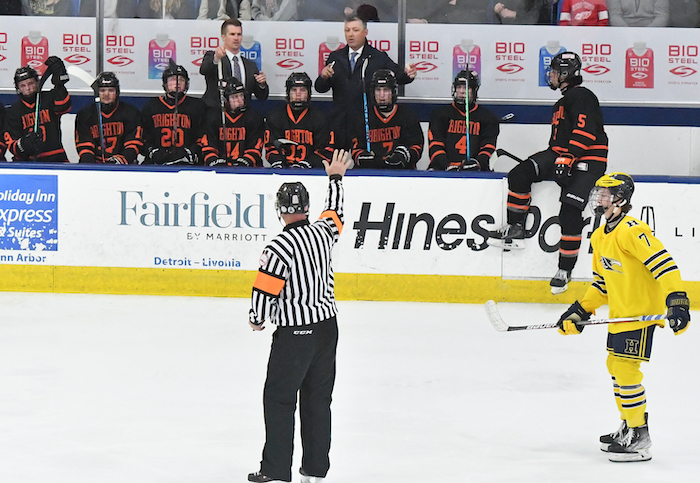 DiCristofaro is the assigner and referee-in-chief for the MHSAA’s Northeast Hockey Referees Association, and he has seen Smolinski’s growth first-hand.
DiCristofaro is the assigner and referee-in-chief for the MHSAA’s Northeast Hockey Referees Association, and he has seen Smolinski’s growth first-hand.
“Obviously he’s got great instincts and a feel for the game, along with a wealth of experience, all of which has allowed him to climb the ladder quickly,” said DiCristofaro. “It’s been a joy to watch his growth as an official.”
Fast forward to last Friday, and there were Smolinski and May sharing duties as referees during the MHSAA Semifinal with linesmen Michael Andrews and Thomas Robbins.
In between, there has been a learning curve that still continues, but the jump to officiating was not quite as daunting as his introduction to the NHL.
“I was scared to death. My first game was against Mario Lemieux. I’m in the old Boston Garden and now I’m playing against these guys and it’s their job, and they’re out there trying to make a living,” Smolinski recalled.
The emotions were not running nearly as frenzied for his first game as an MHSAA official, obviously, yet respect came in a different form.
“I couldn’t pick the puck up, I was breathing heavily; it was Kevin and me doing a two-man game in Brighton,” Smolinski recalled. “There were a few high-end kids playing, and I’m thinking, ‘I’m dying here.’ You know, there’s no training for that first time.”
What that experience did, however, was revitalize Smolinski in a new way. His playing career is well documented, not only in the NHL, but around Michigan. He enjoyed an honor-laden career at Michigan State University from 1989-93 before joining the Boston Bruins (who had drafted him three years earlier) at the end of the ’93 NHL campaign. Even after his final season, with Montreal in 2007-08, he stayed in the game via men’s leagues, or coaching his son, Max.
Smolinski and his wife, Julie, have three daughters: Ashtyn (22), Jojo (16) and Rylen (12), along with Max, whom dad coached for seven years including during a national championship run with a Little Caesars U15 team in 2019. Max, 19, is now playing collegiately at Rensselaer Polytechnic Institute.
So, for Smolinski, officiating offers a new chapter.
“Reffing brought back ... I wouldn’t say love of the game, because that’s always been there; it’s a different side of enjoying the game now. I have no horse in the race, my son’s off to college, my daughters are doing their thing; I wanted to find something new in the game,” Smolinski said. “I’ve coached, and I don’t want to do that. I found this, and I’ve stuck with it.”
Old College Ties
One of the great benefits of athletics at any level are the friendships made. For two kids who met in their first years on the MSU campus and forged a bond that lasts to this day, it’s amazing how their careers reached the pinnacle and have now come full circle.
Wes McCauley, an MSU teammate, is one of Smolinski’s best friends. After numerous years in the minor leagues, McCauley, like his friend, made it to the NHL. But McCauley made it as an official, working his first NHL game in 2003, when Smolinski was nearing the end of his playing career.
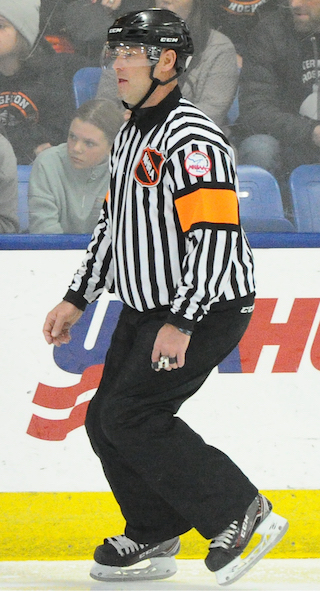 Their games lined up on just a few occasions in the NHL, and the two lobbied hard to have McCauley work Smolinski’s 1,000th career game in his final season with the Canadiens in 2007-08. The request, sadly, was denied by the league.
Their games lined up on just a few occasions in the NHL, and the two lobbied hard to have McCauley work Smolinski’s 1,000th career game in his final season with the Canadiens in 2007-08. The request, sadly, was denied by the league.
On the rare occasions when the friends did share the same ice, less than a handful by Smolinski’s count, it was McCauley who was forced to rebuff any attempts at fraternization. It’s just part of an official’s edict.
“For both of us, it was amazing; it was just great,” Smolinski said. “I’d say, ‘Hey man what’s up?’ and he says, ‘Can’t talk.’ I’m like, ‘What do you mean, we talk all the time.’ Again, he’s like, ‘Can’t talk, get away from me.’ You know, it was just business.”
McCauley then reached the 1,000-game plateau himself in 2018 and is still going strong as a regular selection for playoff duties with nine Stanley Cup Finals assignments, including last year.
So, it should have been natural for Smolinski to go to his old friend immediately for officiating pointers once he joined the ranks, right? Well, maybe not immediately.
“I talk to Wes all the time, but I actually hid it from him right out of the gate because I didn’t want to take his razzing. Eventually it got out, and he was loving it. He started sending me whistles and visors and pants,” Smolinski said, grinning. “And none of it fit, you know, because I’m older and fatter, and he’s so damn skinny. So, I still had to go out and get all new gear.”
Both Sides Now
Having been to the top of his profession, now moving to the other side of that same mountain that his friend McCauley scaled, the respect has grown for those blowing the whistle.
“The preparation for officiating is much more mental,” Smolinski said. “Way more rules oriented. You’re always trying to get away with things that you can as a player; now you have to police that.”
Smolinski has a distinct advantage.
“I know everything they’re trying to do because I’ve done it. I know where you’re going with the puck, I know what kind of breakout you’re trying to do,” Smolinski said. “I have all the instincts, now I just try to stay out of the way and not ruin their game. The most fun is watching the game develop and the ups and downs. For me to be out there and enjoy it with them, that’s the fun part.”
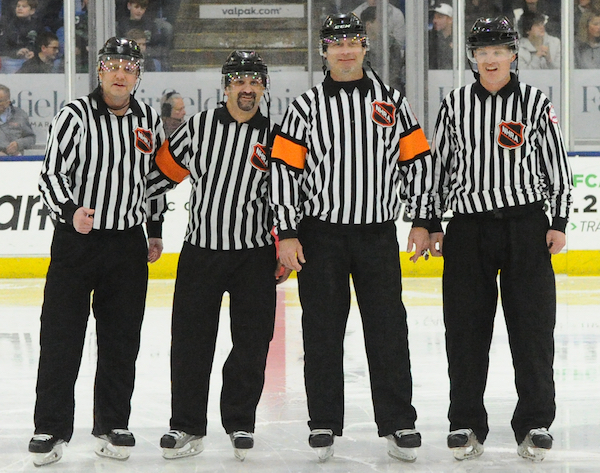 Those who have played hockey at any level have a built-in advantage should they consider the officiating avocation: the ability to skate. Unlike officiating in any other sport, skating is a prerequisite. This makes the pool limited, and almost solely composed of former players. Smolinski offers this advice.
Those who have played hockey at any level have a built-in advantage should they consider the officiating avocation: the ability to skate. Unlike officiating in any other sport, skating is a prerequisite. This makes the pool limited, and almost solely composed of former players. Smolinski offers this advice.
“I prefer sticking with high school because I think there’s more decorum, more administrative structure. Kids are playing for their schools, there’s loyalty there,” said Smolinski. “And there is more accountability. People need report to athletic directors and supervisors. Other levels can be more loosely governed, or a bit more maverick in nature. Moms and dads get involved more, coaches maybe know a little less,” said Smolinski.
He has, in fact, worked a handful of non-school games, and there’s a stark difference.
“I wanted to see what was going on, and I see it first-hand,” Smolinski said. “There are some crazy people and parents out there, and these guys are getting absolutely tortured. I’ve been tortured. There has to be a level of respect for what officials do. I think schools can rein that in a little more. All the guys I’ve met give up a lot of time and work hard because they love to do it and love the game.”
All sports need an assist from school administration and from those who once played the games to keep the officials recruitment moving in the right direction. People like Smolinski can help.
“He clearly doesn’t need to do this, and that’s what makes it so fantastic,” DiCristofaro said. “We need more people who have played – at any level – to do what he’s done and stay in the game as officials.”
Smolinski continues to promote the game in other ways as well. Currently, he is involved in the NHL’s Learn To Play initiative, which aims to inspire youth and welcome more families into the hockey community.
“We work hand-in-hand with the NHL Players Association for player development and industry growth,” Smolinski said. “Ages 5 to 9 are introduced to hockey, get head-to-toe gear and instruction, and meet some former players.”
The idea is to have fun first, which can translate into years and maybe even a lifetime in the sport. It’s a lifetime that has given Smolinski so much and continues to do so as he watches it unfold for others from his new vantage point.
PHOTOS (Top) MHSAA official Bryan Smolinski signals during Friday's Division 1 Semifinal between Brighton and Hartland. (2) Smolinski, a retired NHL standout, communicates with the Bulldogs' bench. (3) Smolinski keeps watch during game play. (4) Smolinski, third from left, with his crew: Michael Andrews, Kevin May and Thomas Robbins.

